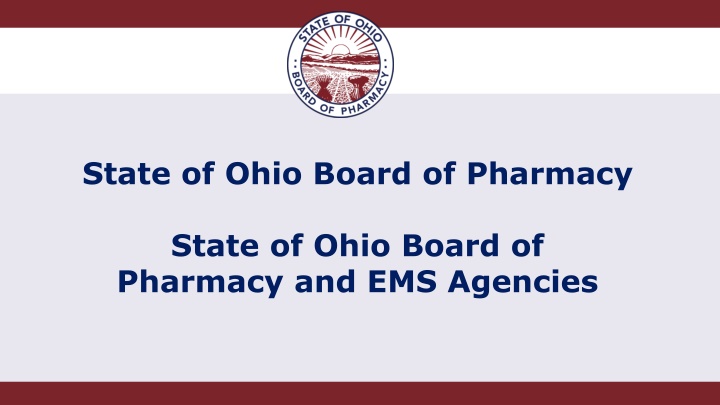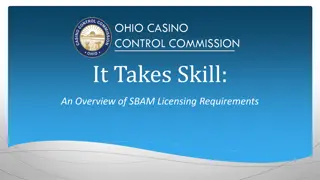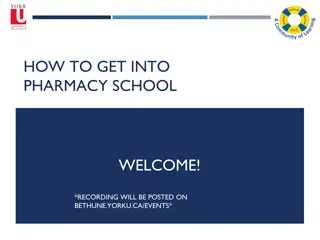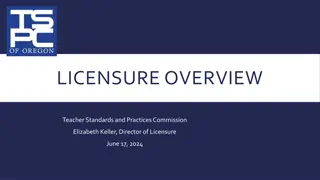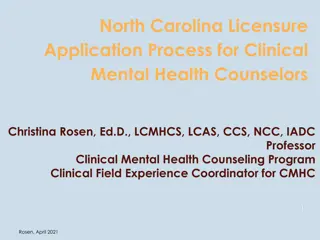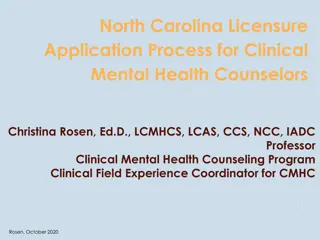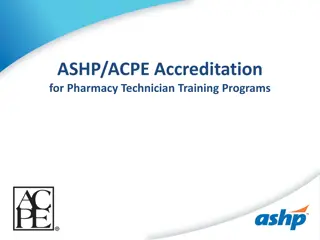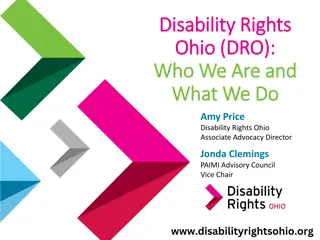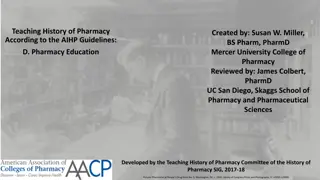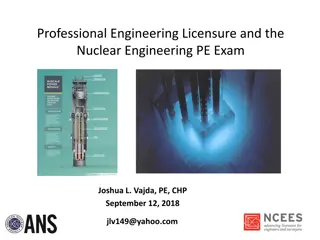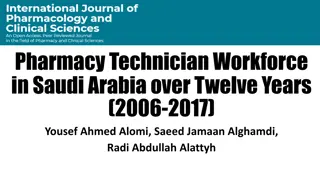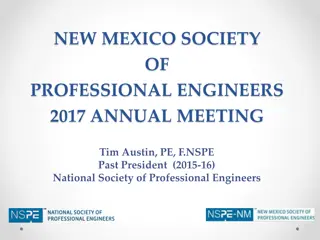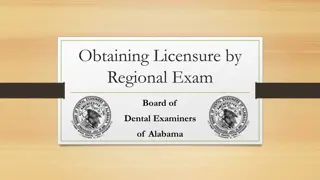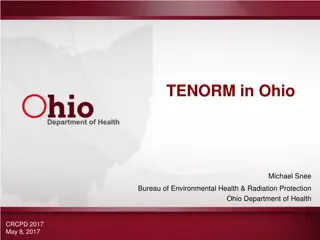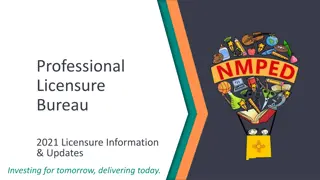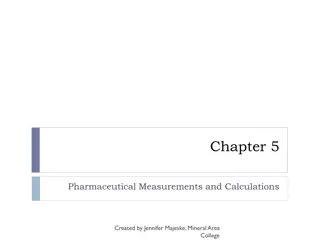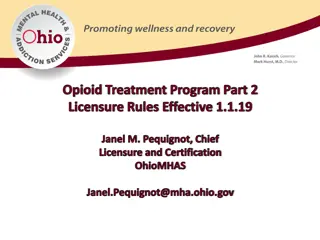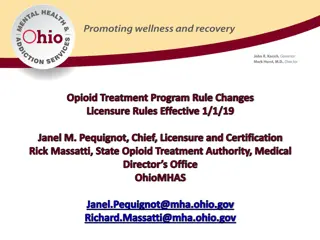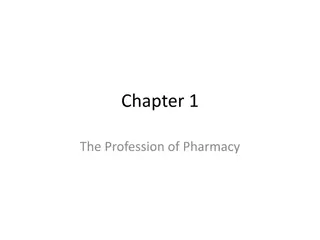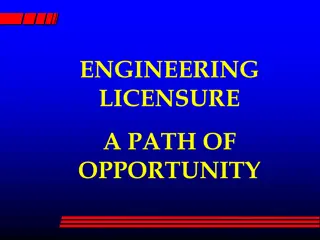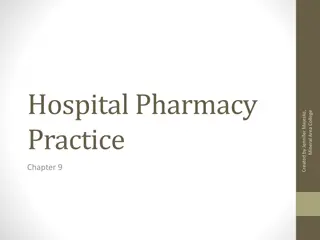Ohio Board of Pharmacy: Rule Reorganization and Licensure Requirements Overview
The State of Ohio Board of Pharmacy is undergoing a rule reorganization with new licensure requirements for EMS agencies. The reorganization includes division for each license type and chapters for terminal distributors. General licensure requirements mandate a responsible person, such as an MD/DO or pharmacist, to be present at all times. Changes in responsible personnel must be promptly reported to the Board.
Download Presentation

Please find below an Image/Link to download the presentation.
The content on the website is provided AS IS for your information and personal use only. It may not be sold, licensed, or shared on other websites without obtaining consent from the author.If you encounter any issues during the download, it is possible that the publisher has removed the file from their server.
You are allowed to download the files provided on this website for personal or commercial use, subject to the condition that they are used lawfully. All files are the property of their respective owners.
The content on the website is provided AS IS for your information and personal use only. It may not be sold, licensed, or shared on other websites without obtaining consent from the author.
E N D
Presentation Transcript
State of Ohio Board of Pharmacy State of Ohio Board of Pharmacy and EMS Agencies
Overview Overview of rule reorganization General licensure requirements New rules for theft and loss reporting Drug shortage issues/drug transfers Upcoming changes/challenges
Rule Reorganization Board is in the process of a rule reorganization. Each license type is given its own division and each terminal distributor has its own chapter. Starting in 2020, the Board will be issuing public facing inspection guides.
Rule Reorganization 4729 State Board of Pharmacy 4729-01 Meetings 4729-02 Administration 4729-03 Public Records 4729-04 Confidential Personal Information 4729-05 Recognized and Approved Schools of Pharmacy 4729-06 Continuing Education Providers
Rule Reorganization 4729:5 Terminal Distributors of Dangerous Drugs 4729:5-1 Definitions 4729:5-2 Licensure 4729:5-3 General Provisions 4729:5-4 Discipline 4729:5-5 Outpatient Pharmacies 4729:5-6 Nuclear Pharmacies 4729:5-7 Charitable Pharmacies 4729:5-8 Nonresident Pharmacies
Rule Reorganization 4729:5 Terminal Distributors of Dangerous Drugs 4729:5-9 Hospitals and Institutional Facilities 4729:5-10 Drug Repositories 4729:5-11 Pain Management Clinics 4729:5-12 Medication Therapy Management 4729:5-13 First Aid Departments 4729:5-14 Emergency Medical Services 4729:5-15 Animal Shelters 4729:5-16 Approved Laboratories 4729:5-17 Medical Oxygen, Nitrous Oxide, Medical Gases and Dialysis Solutions 4729:5-18 Office-Based Opioid Treatment
General Licensure Requirements for EMS Agencies
Licensure Requirements All licensees are required to have a responsible person at all times. For an EMS Agency, the RP must be an MD/DO or Pharmacist. When there is a change of responsible person, the Board must be notified within ten days of the effective date of the appointment. New RP notification must be submitted using eLicense system (instructions available on Board s TDDD licensing website: https://www.pharmacy.ohio.gov/Licensing/TDDD.aspx)
Licensure Requirements Renewal for all TDDD licenses is now biennial. Licenses expire March 31st of odd numbered years. Next renewal date is 3/31/2021. EMS main headquarters are subject to standard fees ($320 Cat 2 / $440 Cat 3). Satellite locations are eligible for a reduced fee of $120.
Licensure Requirements EMS Agencies are limited licenses. Meaning they are only permitted to possess drugs authorized by the agency s medical director. Any time a drug is added to the drug list, the full list must be uploaded electronically. The complete drug list, not just additions, must be uploaded electronically using the Board s document upload feature. More information can be accessed here: www.pharmacy.ohio.gov/druglist
Licensure Requirements A modification to the drug list shall require an update to the EMS organization's protocols. Any updates or changes to the protocols shall only be submitted to the board upon request. The addition/change of a new RP requires the submission of a new drug list.
Licensure Requirements Licensure renewal/initial licensure must now be conducted using Ohio s eLicense system. Requires SSN of Medical Director serving as the responsible person. Same system used to renew medical license. NOTE: Changes to ORC 149.43 prohibit the Board from releasing any employer or personal information for EMS Medical Directors. All licensing rosters for EMS Agencies produced by the Board have redacted all relevant information.
Licensure Requirements Any change of the EMS organization's personnel list shall be updated within thirty days of a change of personnel. Personnel lists shall consist of the following: list of personnel employed, including volunteers, by the EMS organization who may access and administer dangerous drugs, which includes the name of each employee or volunteer, level of certification, certification number, and expiration date; and Any change of personnel shall only be submitted to the board upon request.
Licensure Requirements "Posting up at a special event" means locating an EMS unit containing dangerous drugs at a location other than a location licensed by the board of pharmacy for more than twenty-four consecutive hours pursuant to a formal agreement with the sponsors of the event and where the EMS unit is under the direct supervision of the EMS personnel on duty. Posting up at a special event requires notification. Notification shall be provided prior to the special event. The form and instructions are available here: www.pharmacy.ohio.gov/postingup
Licensure Requirements Requirement Notification? Drug List Must be submitted upon initial licensure and whenever there is a new medical director or an update to the drug list. Must be submitted upon initial licensure and then updated as necessary. No requirement to submit if changed or upon renewal. Must be submitted upon initial licensure and then updated as necessary. No requirement to submit if changed or upon renewal. Posting up at a special event requires notification. Notification shall be provided prior to the special event. The form and instructions are available here: www.pharmacy.ohio.gov/postingup Personnel List Protocols Posting Up at a Special Location
Reporting Theft or Significant Loss Rule 4729:5-3-02 of the Ohio Administrative Code require a licensee (terminal distributor) to notify the Board of any theft or significant loss of dangerous drugs (controlled and non-controlled prescription drugs) immediately upon discovery of the theft or significant loss. This includes dangerous drugs in transit that were either shipped from or to a prescriber, terminal distributor, or drug distributor. In addition, the licensee must also contact local law enforcement and, if the theft or significant loss involves controlled substances (and the licensee holds a DEA registration), the Drug Enforcement Administration (DEA) immediately upon the discovery of a theft or significant loss.
Reporting Theft or Significant Loss Theft or significant loss must be reported immediately upon discovery using either of the following methods: 1. Via the Board s online portal. A guidance document for submitting information through the portal is available here: www.pharmacy.ohio.gov/reportTL. NOTE: While not required to use the online portal for immediate notification, the Board strongly encourages a licensee to utilize this option. 2. You may call the Board s main line (614.466.4143) and ask to speak with the Compliance and Enforcement Department or your assigned compliance specialist, inspector or agent.
Reporting Theft or Loss of Drug Documents Drug documents include any of the following: 1. Uncompleted prescription blank(s) used for writing a prescription; 2. Written prescription order(s) not yet dispensed; 3. Original prescription order(s) that have been dispensed; or 4. DEA controlled substance order forms (DEA Form 222). IMPORTANT: Unlike dangerous drugs, any theft or loss of drug documents must be reported to the Board immediately upon discovery. For more information, visit www.pharmacy.ohio.gov/theft
Significant Loss What Does this Mean? When determining whether a loss is significant, a registrant should consider, among others, the following factors: 1. The actual quantity of dangerous drugs lost in relation to the type of business; 2. Whether the loss of the dangerous drugs can be associated with access to those drugs by specific individuals, or whether the loss can be attributed to unique activities that may take place involving the dangerous drugs;
Significant Loss What Does this Mean? 3. A pattern of losses over a specific time period, whether the losses appear to be random, and the results of efforts taken to resolve the losses; 4. Whether the specific dangerous drugs are likely candidates for diversion; and 5. Local trends and other indicators of the diversion potential of the missing dangerous drugs.
Significant Loss What Does this Mean? Whether a significant loss has occurred depends, in large part, on the licensee s business type and the likelihood of a rational explanation for a particular occurrence. Further, the loss of a small quantity of dangerous drugs, repeated over a period of time, may indicate a significant problem, which must be reported. For more information on reporting a theft or significant loss visit: www.pharmacy.ohio.gov/theft
Drug Shortages / Transfers Section 4729.51 (A) of the Ohio Revised Code allow for occasional wholesale sales between non-pharmacy TDDDs as follows: 1. A licensed terminal distributor of dangerous drugs having more than one licensed location may transfer or deliver dangerous drugs from one licensed location to another licensed location owned by the terminal distributor if the license issued for each location is in effect at the time of the transfer or delivery.
Drug Shortages / Transfers 2. A licensed terminal distributor of dangerous drugs that is not a pharmacy may make occasional sales of naloxone at wholesale. 3. A licensed terminal distributor of dangerous drugs that is not a pharmacy may make occasional sales of dangerous drugs at wholesale if the drugs being sold are in shortage, as defined in rules adopted by the state board of pharmacy under section 4729.26 of the Revised Code.
Drug Shortages / Transfers What is a drug shortage? OAC 4729:5-3-09 "Drug shortage," with respect to an occasional sale, means a drug on the United States food and drug administration's drug shortage list that is not commercially available regardless of the reason that the drug is not available, including the absence of a manufacturer for the drug or the lack of a readily available supply of the drug from a manufacturer or wholesaler.
Upcoming Changes / Challenges 1:1 Exchange of Controlled Substances EMS provision of care during non-emergencies
Upcoming Changes / Challenges New DEA Regulations for EMS Agencies (The Protecting Patient Access to Emergency Medications Act of 2017) - https://www.cdc.gov/phlp/docs/brief-ema.pdf DEA Registration for EMS Agencies. Language added by PPAEMA now allows EMS agencies to receive their own DEA registration to administer controlled substances. Key factors of this new registration include the following: o EMS agencies that service multiple states will need DEA registrations for each of those states. o Hospital-based EMS agencies may use the hospital s DEA registration and will not need to register with the DEA separately.
Upcoming Changes / Challenges Use of Standing Orders. The PPAEMA allows EMS agencies to administer controlled substances in schedule II, III, IV, or V outside the physical presence of a medical director or authorizing medical professional. o To do so, the EMS agency must 1) be authorized to do so by state law and 2) have a standing order or verbal order from a medical director or an authorizing medical professional.
Upcoming Changes / Challenges Storage of Controlled Substances. EMS agencies may store controlled substances in the agency location registered with the DEA, unregistered locations, and in EMS vehicles used by the agency. The United States Attorney General must be notified of all unregistered locations at least 30 days before the controlled substances are initially delivered to those locations.
Upcoming Changes / Challenges Restocking EMS Vehicles at Hospitals. Following an emergency response, EMS agencies may restock their EMS vehicles with controlled substances from a hospital without completing CSA order forms.
